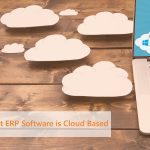
What incentives do big companies have to introduce new technology when a sizable chunk of revenue stems from just maintaining the customer base with little need to re-launch or innovate?
Surprisingly, as noted in a Forbes report on a Gartner survey, that’s the modus operandi for “nearly every enterprise software company” selling on-premise software. Ironically, according to Gartner, it is simply how a lot of these larger, on-premise vendors survive.
It doesn’t take a Bill Gates, or Warren Buffet, to recognize the competitive nature of the ERP marketplace from software companies dedicated to raising the level of business productivity. The winners are those who are motivated and challenged to innovate, developing new dimensions to their trust names.
For Web-based NetSuite, a company with over 60,000 users worldwide, the continue to find that all-important value that customers are seeking. So much so, that NetSuite, one of the first cloud-based ERP software companies, was ranked as one of the “fastest growing vendors worldwide from 2012 to 2013.”
More and more, such success stems from business becoming more “agile and responsive” to an ever-changing market. What’s more, it’s the legacy systems from a by-gone era that owners reluctant to embrace change turn to.
As a result, maintenance agreements continue to be the revenue mainstay of software companies not capable of offering competitive—and efficient—ERP software; this, while cloud-based software, such as NetSuite continues breaking sales records because what their platforms are designed to give businesses what they “need to survive and grow.”
NetSuite is ideal for the small to mid-size companies who need a single integrated system for business processes that include automating back office accounting tasks.
Learn more. Contact us for a free demo today, how a successful NetSuite partner like TMC can guide you through the pre-sale and implementation steps.
Written by B.H. (Sales Team)
{{cta(’52a6f94c-7ea9-4a8d-bf2d-9432e3c12709′)}}




